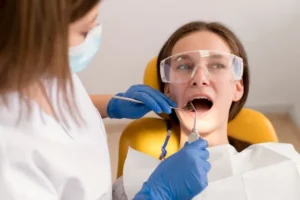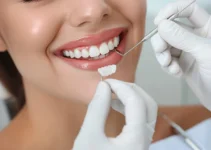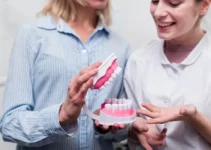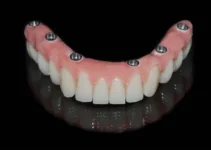Gingivitis, a common and mild form of gum disease, causes irritation, redness, and swelling of your gums. Fortunately, it is preventable and manageable with the right oral hygiene practices. Regular brushing and flossing, coupled with professional dental cleanings, can significantly reduce your risk. Incorporating antibacterial mouthwash into your daily routine can also help control the bacteria that contribute to the development of gingivitis. If symptoms persist, consulting a dental professional is crucial for further assessment and treatment to prevent progression to more severe gum diseases.
Understanding Gingivitis
Gingivitis is a common and mild form of gum disease that causes irritation, redness, and swelling of your gingiva, the part of your gum around the base of your teeth. It’s important to take gingivitis seriously and treat it promptly. Gingivitis can lead to much more serious gum disease called periodontitis and tooth loss.
Understanding gingivitis involves knowing its definition, causes, and symptoms. By being aware of these aspects, you can take proactive measures to maintain your oral health. Let’s delve into what gingivitis is, its primary causes, and how to identify the symptoms early on.
What is Gingivitis?
Gingivitis is an inflammation of the gums, typically caused by a bacterial infection. If left untreated, it can escalate to a more severe form of gum disease known as periodontitis. Gingivitis is reversible with good oral hygiene and professional treatment. According to the American Dental Association, gingivitis is one of the most common oral conditions affecting people worldwide. This condition is characterized by irritated and swollen gums that bleed easily during brushing or flossing. Although gingivitis may not always cause discomfort, the subtle warning signs should not be ignored because they can indicate a larger underlying issue.
Causes of Gingivitis
The primary cause of gingivitis is poor oral hygiene that encourages plaque formation on teeth. Plaque is a sticky, invisible film composed mainly of bacteria that forms on your teeth when sugars and starches interact with bacteria normally found in the mouth. If plaque is not removed, it hardens and becomes tartar (calculus), which collects bacteria and irritates the gums.
Several factors can contribute to gingivitis, including:
- Poor oral hygiene: Irregular brushing and flossing habits.
- Smoking or chewing tobacco: These habits can impair the gum tissue’s ability to repair itself.
- Hormonal changes: Conditions like puberty, menstrual cycles, pregnancy, and menopause can increase gum sensitivity.
- Certain illnesses: Diseases such as diabetes can affect gum health.
- Medications: Some drugs can reduce saliva flow, which can negatively affect gum health.
- Family history: Genetic predisposition can play a significant role in gum diseases.
Symptoms of Gingivitis
The symptoms of gingivitis can be subtle and not always painful, making it easy for the condition to go unnoticed. Recognizing the signs is crucial for early intervention and treatment. Common symptoms include:
- Red, swollen gums: Healthy gums are firm and pale pink, whereas inflamed gums appear red and swollen.
- Bleeding gums: Gums that bleed easily during brushing or flossing are a telltale sign of gingivitis.
- Receding gums: This condition may cause gums to pull away from the teeth, giving them an elongated appearance.
- Bad breath: Persistent bad breath or a bad taste in the mouth may indicate gum disease.
- Soft, tender gums: Gums that feel tender to the touch can be indicative of inflammation.
Early detection and good oral hygiene can help manage and even reverse gingivitis. Regular dental check-ups are essential for maintaining gum health and preventing the progression to more severe periodontal diseases.
Understanding gingivitis is crucial for maintaining your oral health. Be sure to explore our other articles on related topics, such as periodontitis and effective oral hygiene practices, to further protect your smile.
Home Remedies for Treating Gingivitis
Gingivitis, the inflammation of the gums, is an early stage of gum disease that, if left untreated, can lead to more severe oral health issues. It is often caused by the accumulation of plaque and bacteria on the teeth and gums. While professional dental care is crucial, certain home remedies can help manage and alleviate the symptoms of gingivitis. In this article, we will delve into effective home remedies for treating gingivitis, including proper oral hygiene, natural antibacterial mouthwashes, and dietary changes that support oral health.
Implementing these practices can help reduce gum inflammation, prevent plaque buildup, and promote overall oral health. Let’s explore these home remedies in detail.
Proper Oral Hygiene
The foundation of any treatment for gingivitis starts with maintaining proper oral hygiene. Brushing and flossing regularly can significantly reduce plaque buildup, which is the primary cause of gingivitis. It is recommended to brush your teeth at least twice a day using fluoride toothpaste. Fluoride is known for its ability to strengthen tooth enamel and fight decay.
Flossing is equally essential, as it removes food particles and plaque from areas that a toothbrush cannot reach. Using an interdental brush or water flosser can also be beneficial for cleaning between the teeth. Consistency in these practices is key to preventing and treating gingivitis effectively.
In addition to brushing and flossing, consider using a tongue scraper. The tongue can harbor bacteria that contribute to oral health issues. Regularly cleaning your tongue can help reduce bad breath and improve overall oral hygiene.
Natural Antibacterial Mouthwash
Incorporating a natural antibacterial mouthwash into your daily routine can provide additional protection against gingivitis. Several natural ingredients have antibacterial properties that can help reduce gum inflammation and kill harmful bacteria. One popular option is a saltwater rinse. Saltwater has been used for centuries to promote healing and reduce inflammation. To make a saltwater rinse, mix half a teaspoon of salt in a glass of warm water and swish it around your mouth for 30 seconds before spitting it out.
Another effective natural mouthwash is a mixture of hydrogen peroxide and water. Hydrogen peroxide is a powerful antiseptic that can help remove plaque and bacteria. Combine equal parts of 3% hydrogen peroxide and water, swish the solution in your mouth for about 30 seconds, and then spit it out. Ensure you do not swallow the solution.
Essential oils like tea tree oil and peppermint oil also have antibacterial properties. You can add a few drops of these oils to a cup of water and use it as a mouthwash. Always ensure that the essential oils are food-grade and safe for oral use.
Dietary Changes to Support Oral Health
Your diet plays a crucial role in supporting oral health and managing gingivitis. Consuming a diet rich in vitamins and minerals can help strengthen your immune system and promote healthy gums. Foods high in vitamin C, such as oranges, strawberries, and bell peppers, are especially beneficial as vitamin C is crucial for gum health and can help reduce inflammation.
Incorporate plenty of leafy green vegetables, nuts, and dairy products into your diet. These foods provide essential nutrients like calcium and vitamin D, which are important for maintaining healthy teeth and gums. Avoid sugary and acidic foods and beverages as they can contribute to plaque buildup and gum disease.
Hydration is also vital for oral health. Drinking plenty of water helps wash away food particles and bacteria from your mouth. Green tea is another excellent choice as it contains antioxidants that can reduce inflammation and fight bacteria.
By adopting these dietary changes, you can support your efforts to treat gingivitis and improve your overall oral health.
Implementing these home remedies can be a great step toward managing gingivitis. For more comprehensive oral health tips and treatments, explore our other articles. Your journey to a healthier smile begins with knowledge and action.
Professional Treatment Options
When it comes to maintaining and improving oral health, there are numerous professional treatment options available. These treatments are essential for addressing various dental issues and ensuring that patients maintain optimal oral health. Below, we explore some of the most common professional treatment options, including dental cleanings, medications, and surgical treatments. Understanding these options can help you make informed decisions about your dental care. Whether you’re dealing with cavities, gum disease, or more complex conditions, professional interventions can provide effective solutions. Let’s delve into each of these treatments in more detail.
Dental Cleanings
Regular dental cleanings are a fundamental component of preventive dental care. These professional cleanings, typically performed every six months, help to remove plaque and tartar buildup that cannot be eliminated with regular brushing and flossing. This buildup is a significant contributor to dental decay and gum disease.
During a dental cleaning, a dental hygienist will use specialized tools to clean your teeth thoroughly. This process includes:
- Scaling to remove plaque and tartar from the tooth surfaces
- Polishing to remove stains and smooth the tooth surfaces
- Fluoride treatment to strengthen the enamel and prevent cavities
Consistent dental cleanings can significantly reduce the risk of dental issues and contribute to overall oral health.
In addition to cleaning your teeth, dental professionals can also provide personalized advice on how to maintain your oral hygiene at home. Tips often include proper brushing techniques, the best type of floss to use, and other preventive measures tailored to your specific dental needs.
Medications
In certain cases, dental conditions may require the use of medications to treat infections, reduce pain, or manage chronic conditions. These medications can be prescribed by your dentist and may include:
- Antibiotics to treat bacterial infections
- Pain relievers to alleviate discomfort
- Anti-inflammatory drugs to reduce swelling and inflammation
- Specialized mouthwashes to prevent gum disease
Antibiotics are often prescribed for conditions such as periodontal disease, dental abscesses, and post-surgical infections. It’s crucial to follow your dentist’s instructions carefully when taking these medications to ensure their effectiveness and avoid potential side effects.
Over-the-counter medications can also play a role in managing minor dental pain and inflammation. However, it’s always best to consult with your dentist before starting any new medication to ensure it won’t interfere with other treatments or existing conditions.
Surgical Treatments
For more severe dental issues, surgical treatments may be necessary. These procedures can range from relatively simple extractions to more complex surgeries, such as dental implants or bone grafting. Surgical treatments are often required when:
- Teeth are severely damaged or decayed
- There is a need for tooth replacement
- Gum disease has caused significant bone loss
- Orthodontic treatments require surgical intervention
One common surgical procedure is the extraction of impacted teeth, such as wisdom teeth, which can cause pain and misalignment of other teeth. Surgical extractions involve removing the entire tooth, including the roots, to prevent further complications.
Another advanced surgical treatment is the placement of dental implants. These implants serve as a foundation for replacement teeth and help maintain the structure of the jawbone. Bone grafting procedures may be required before implant placement to ensure there is enough bone to support the implant.
Each surgical treatment has its own set of benefits and risks, and your dentist will provide detailed information about what to expect before, during, and after the procedure. It’s important to follow all post-operative care instructions to ensure a successful recovery.
Professional dental treatments are key in maintaining oral health and addressing various dental conditions. Explore more articles to deepen your understanding of specific dental procedures and the latest advancements in dental care.
Frequently Asked Questions About Gingivitis Treatment
If you’re looking to understand more about gingivitis, its impact on oral health, and how to effectively treat it, here are some common questions answered by a dental specialist.
What is the most effective way to cure gingivitis?
The most effective way to cure gingivitis involves maintaining good oral hygiene practices. This includes brushing your teeth at least twice a day, flossing daily, and using an antibacterial mouthwash to reduce plaque buildup and inflammation. Additionally, regular dental check-ups for professional cleanings are crucial to remove any tartar and to monitor your gum health. If gingivitis persists, a dentist can perform a deep cleaning procedure called scaling and root planing to remove plaque and tartar from beneath the gums. Quitting smoking and managing conditions like diabetes also contribute significantly to the treatment of gingivitis.

My name is Salman Kapa, a 73-year-old expert in bone regeneration and dental implantology. With decades of experience in the field, I am dedicated to advancing our understanding of oral health and hygiene. Through my research and writing, I aim to contribute to the development of innovative solutions in dental care.




